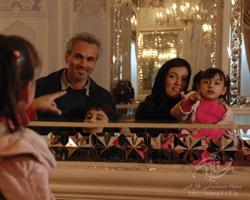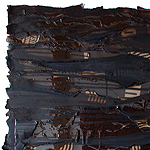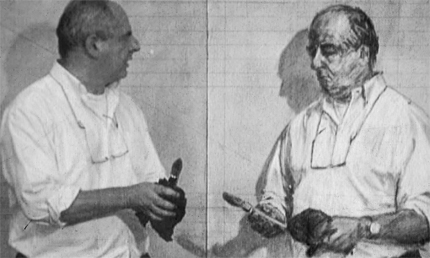
“Tehran, Tehran” : one screening, two intensely different morsels of Iranian life in the big city.
I’ll start with the first. “Tehran, Tehran” was offered as one of the highlights of the Gene Siskel’s annual Festival of Iranian Cinema, and included two chapters: “Episode One: Days of Acquaintance,” by Dariush Mehrjui, and “Episode Two: The Last String,” by Mehdi Karampour. It’s not clear from the Siskel’s press release if the final product was a collaboration between the two directors or the product of someone else’s editorial aegis, but my god, what an unbalanced film.
“Episode One” was absolutely adorable, in both the loving and cutesy senses of the term. The chapter opens with a scene sort of reminiscent of Majid Majidi’s 1997 “Children of Heaven” (one of my favorite movies of all time): a mom, dad, son and daughter sit around the television in a one-room home, dad otherwise occupied while mom puts dinner on the table, and the roly poly children chatter in the background. In both movies, the adorableness of the children guarantees success (at least in my overly sentimental movie-going heart). And this family isn’t that much more fortunate than the one in Majidi’s film: they’re getting ready to celebrate the New Year when, in the midst of a rainstorm, the roof collapses! Horror! Tragedy!
But it’s ok: the family makes it out alive, the girl saves her doll and the boy saves his playstation. This sets the tone for the rest of the movie: plucky cheerfulness in the face of a sometimes cold world. The family cheerfully sets up a tent in their courtyard, decorate it with lights, have dinner with their neighbors, and then randomly join a bus tour of senior citizens visiting the tourist sites of Tehran, a trip that will end up radically changing their fortunes for the better, thanks to the eccentric and generous good will of the old folks. Pantea Bahram and Ghorban Najafi are pitch-perfect in their roles as mom and pop.
The camera itself takes on a somewhat adorable character in the film, dreamily reflecting on a vase of flowers or pot of goldfish as the dialogue and action continues to take place off screen; this often create the effect of a really strange, but personable, travelogue, with earnest close-ups of Tehran’s monuments and traditional food dishes, eliciting many a cheerful smacking noise from the mainly Iranian audience in the theater. And that pretty much sums up the first chapter’s effect: a charming and somewhat nostalgic tale that will recall fond memories of family vacations and holiday dinners, whether or not the viewer is from Iran.

And then, the second half started. Karampour’s “The Last String,” an over the top melodramatic story of a group of young musicians whose concert permit is cancelled on the same day of their biggest performance ever, would be eminently forgettable if it weren’t so darn embarrassing to watch. A cast of very pretty young people confess their distress over governmental and parental oppression, a distress that will result in the untimely death of one of their group. The best part for me was when I suddenly remembered I had candy in my purse, and gave myself the task of unwrapping it as silently as possible during the movie. That was pretty engrossing. That, and leading man/Jim Morrison-look alike Reza Yazdani’s incredibly awkward crying scene.
As a whole, “Tehran, Tehran” is interesting in that it provides a glimpse into two very different realities of contemporary Iran. Unfortunately, the two directors abilities were not matched in terms of conveying that reality in a compelling manner.
–Ania Szremski, Arts Editor







